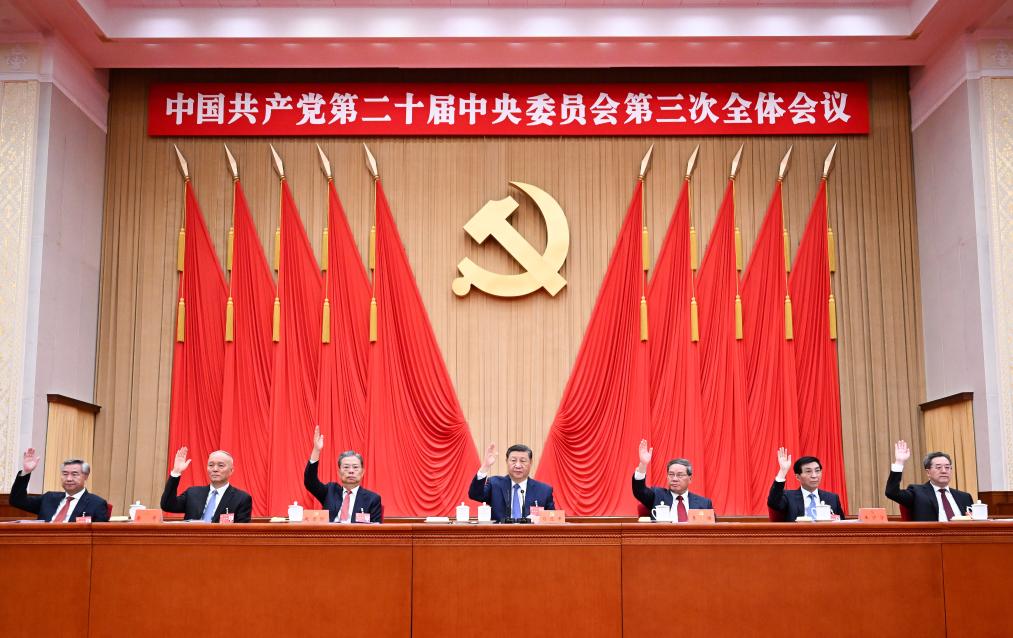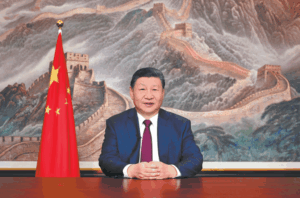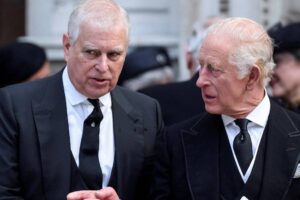
Published 07/19/2024 19:03
At its third plenary session held from Monday to Thursday, the 20th Central Committee of the Communist Party of China (CPC) approved a historic decision to comprehensively deepen reform for China’s modernization. The meeting was presided over by the Political Bureau of the CPC Central Committee, with keynote speeches by General Secretary Xi Jinping, according to a statement released Thursday.
The committee discussed and approved a work report of the Political Bureau delivered by Xi Jinping, as well as the “Decision of the Central Committee of the Communist Party of China on Further Comprehensively Deepening Reform in Pursuit of China’s Modernization.” Xi clarified the details of the draft decision, which aims to improve and develop the socialist system with Chinese characteristics and modernize China’s governance capacity.
The decision by the 20th CPC Central Committee is a milestone for China’s modernization, setting out a comprehensive plan for reforms until mid-century. With a clear focus on innovation, sustainability, security and governance, China is preparing to meet challenges and achieve common prosperity for all its citizens.
Goals and objectives
According to the statement, the goal is to establish a high-level socialist market economy system by 2035, perfecting China’s socialist system and achieving the modernization of the governance system. It is expected that by 2029, the year of the 80th anniversary of the People’s Republic of China, major reform tasks will be completed.
Economic and market reforms
The plan involves building a high-level socialist market economy, balancing market vitality with state control and ensuring a fairer and more dynamic environment. Promoting high-quality development will be achieved through supply-side structural reform, encouraging innovation, and improving infrastructure and supply chain security.
Innovation, education and science
The decision includes comprehensive education reform, advances in science and technology, and talent development, promoting the integration of the real economy with the digital economy. China will seek to strengthen technological and industrial innovation, and create an environment conducive to the development of new productive forces.
Urban-rural planning and sustainability
The integration of urban-rural development aims to reduce disparities and promote common prosperity, while agrarian reform will be deepened. China’s modernization also emphasizes ecological conservation, adopting systems and mechanisms for sustainable development and combating climate change.
National security and defense
The statement highlighted the importance of national security, improving systems and mechanisms to ensure order and stability in the country. In the area of defense, the Party’s leadership over the military will be maintained, with strategies to strengthen military capabilities by 2027.
Leadership and peaceful development
Strengthening the Party’s leadership, the decision underscores the role of Xi Jinping and socialist thought with Chinese characteristics. Independent and peaceful foreign policy will be promoted, with the aim of building a global community with a shared future.
Support for innovation and economic governance
The plenary session also focused on macroeconomic governance, fiscal and tax reform, and strengthening the unified market system. Institutional improvements were made to facilitate high-quality employment and the development of an elderly care sector.
Educational and scientific efforts
Education Minister Huai Jinpeng stressed promoting integrated reform in education, science and technology. China will seek to develop world-class universities and promote the commercialization of scientific research, as well as attract strategic talents.
Rule of law and modernization
China is committed to integrating reform and the rule of law, ensuring that China’s modernization follows a legal and structured path. New legislation will be implemented to support the private economy, finance, ecology and anti-corruption.
External opinion
A symposium to solicit opinions and suggestions from non-CPC figures on drafting a decision to comprehensively deepen reform was announced on Friday. The symposium was attended by leaders of the central committees of other political parties, the All-China Federation of Industry and Commerce, and non-party figures.
Chaired by Xi Jinping, the symposium’s participants included Wang Huning, Cai Qi and Ding Xuexiang, members of the Standing Committee of the Political Bureau of the CPC Central Committee.
Non-CPC figures presented their views on issues such as stimulating economic vitality, reforming the health care system, advancing high-standard opening-up and promoting integrated development across the Taiwan Strait. Xi stressed the CPC’s tradition of broadly seeking opinions from all sectors when formulating major decisions.
Reforms should address problems that hinder China’s modernization, Xi said, highlighting the need to remove institutional obstacles and structural problems, focusing on economic structural reform.
Historic decision
Tang Fangyu, deputy head of the Policy Research Office of the CPC Central Committee, pointed out that the decision on reform is the main outcome of the third plenary session, stressing the importance of in-depth reforms to adapt production relations to productive forces and improve state governance.
Han Wenxiu, executive vice director of the Central Committee for Financial and Economic Affairs, said China will accelerate the construction of a high-standard market system and a unified national market. He also mentioned improvements in market systems for production factors such as labor, capital, land, knowledge, technology, management and data.
China also plans to strengthen macroeconomic governance, improve fiscal relations between central and local governments, and adapt the tax system to new business models. Policies to support pregnancy and improve people’s well-being are also on the agenda.
In the field of education, Huai Jinpeng, Minister of Education, highlighted China’s achievements and the need to promote the commercialization of scientific achievements and the integration of technological and industrial innovation. China seeks to develop world-class universities and strengthen its strategic talent pool.
Shen Chunyao, director of the Legislative Affairs Commission of the Standing Committee of the National People’s Congress, said the rule of law is essential to China’s modernization, with various laws being enacted and revised to support reforms.
Xi Jinping stressed the importance of mobilizing the whole nation to implement reforms effectively, with proper planning and targeted policy implementation, while always keeping reality in view.
Source: vermelho.org.br

